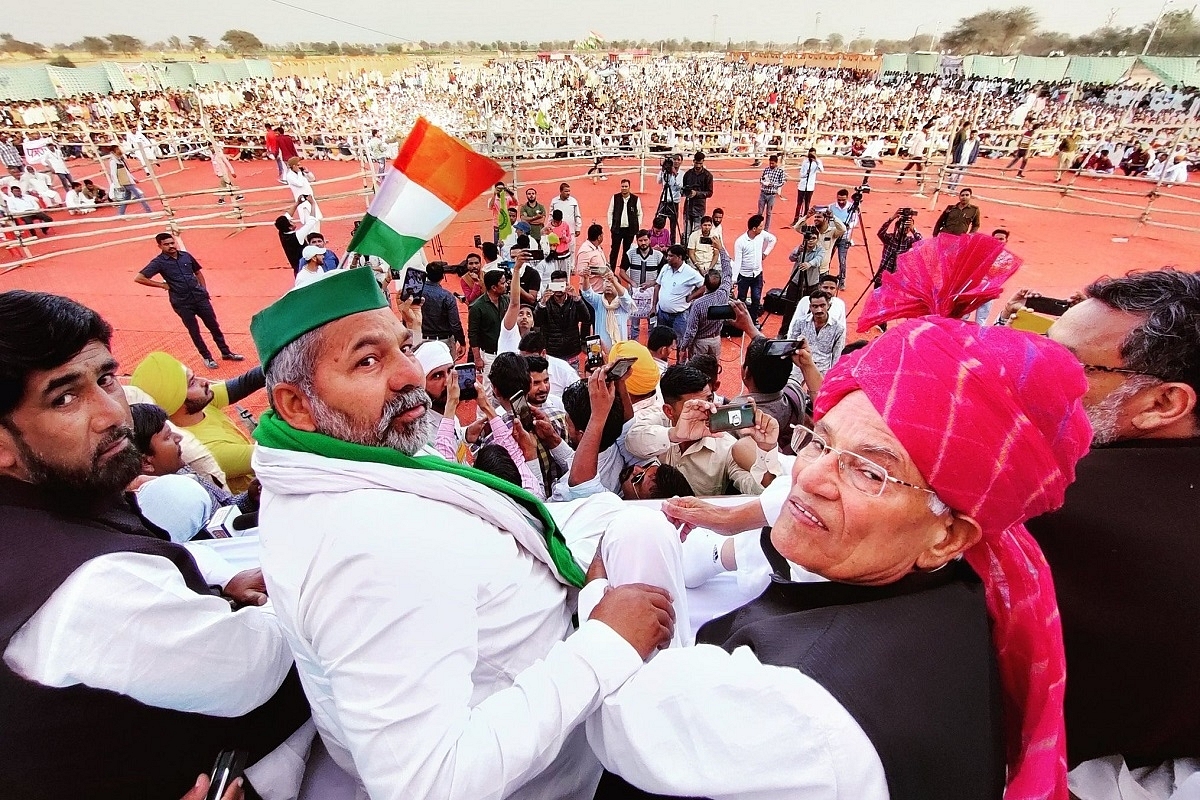Politics
When Rich Farmers Demand Crutches And Wheelchairs... It's Time To Bring In The States
- The tragedy of the farm law agitation is that it is of the rich, by the rich, and for the rich farmers largely.
- It is sad to see strong farmers demanding wheelchairs, even while the weak are learning to get by and walk towards available jobs.

Bharatiya Kisan Union leader Rakesh Tikait with farmers at a protest rally.
The escalating demands of the farm unions even after the government’s capitulation on the repeal of three reform laws shows the need for a change in strategy. As long as the Union government is seen as the primary agent in resolving the problems of Indian agriculture, the rich farmers’ lobby is always going to win.
Three elements of the new strategy ought to be this:
One, any talks on minimum support prices (MSPs), whether it is about giving legal guarantees for the same or extending the system to other crops, should not happen without states being in the picture. A negotiating team should include key members of both Bharatiya Janata Party (BJP) and opposition ruled states. It is the states which need to carry the can on MSPs from now on. Without state involvement, the lopsided benefits flowing from agricultural subsidies to rich farmers in a small region of north India will never be known.
Two, future support for farm reforms, apart from being state-led, should be in the form of central investments in agri-infrastructure, marketing and branding support, and long-term interest-free loans for farmers in the drier areas of Punjab and Haryana to shift to other, less water-intensive crops. The whole logic of reforms goes out of the window if the Centre has to guarantee prices that the market cannot bear. No industry in the world can be permanently sustained on the basis of guaranteed prices for the entire produce.
Making MSP a legal right is a not a sensible option since no one can force buyers to pay a certain price to anyone. Nor should the courts be asked to decide such cases when they can’t cope even with the current pendency levels. Buyers of farm produce can, anyway, choose not to buy at MSP levels, or they may buy clandestinely from those willing to sell below support prices. Legal guarantees can work only if the buyer is the government, but that is fiscally unsustainable.
Three, all future discussions with the farmer unions should be televised, and not held behind closed doors. The nation needs to know what kind of bullies the government is up against, and how no negotiations can be valid if held at gun-point. Televising the talks will, at the very least, force the unions to be reasonable, and if they don’t agree, they can always be called out as bullies.
It does not need reiteration that agriculture is a state subject, but central governments have, for decades since the green revolution, been playing sugar daddy to farm interests, largely for political reasons. There is no other reason why, beyond the need to hold a core buffer stock, the Centre should even be in the business of buying and storing food and other crops from farmers.
Narendra Modi would be doing both farmers and himself a favour by openly announcing that the issue of MSPs will not be left to the states. And that the current procurement plans will be frozen at current levels and gradually be reduced; the money used to pay out these subsidies will consequently be transferred to states in a proportion that is equitable and fair to all states. Non-farming states can use the devolved funds to either subsidise food for their citizens, or invest them in different areas, including, but not limited to, horticulture and other cash crops.
The tragedy of the farm agitation is that it is of the rich, by the rich, and for the rich farmers largely. It is sad to see strong farmers demanding wheelchairs, even while the weak are learning to get by and walk towards available jobs.
Support Swarajya's 50 Ground Reports Project & Sponsor A Story
Every general election Swarajya does a 50 ground reports project.
Aimed only at serious readers and those who appreciate the nuances of political undercurrents, the project provides a sense of India's electoral landscape. As you know, these reports are produced after considerable investment of travel, time and effort on the ground.
This time too we've kicked off the project in style and have covered over 30 constituencies already. If you're someone who appreciates such work and have enjoyed our coverage please consider sponsoring a ground report for just Rs 2999 to Rs 19,999 - it goes a long way in helping us produce more quality reportage.
You can also back this project by becoming a subscriber for as little as Rs 999 - so do click on this links and choose a plan that suits you and back us.
Click below to contribute.
Latest